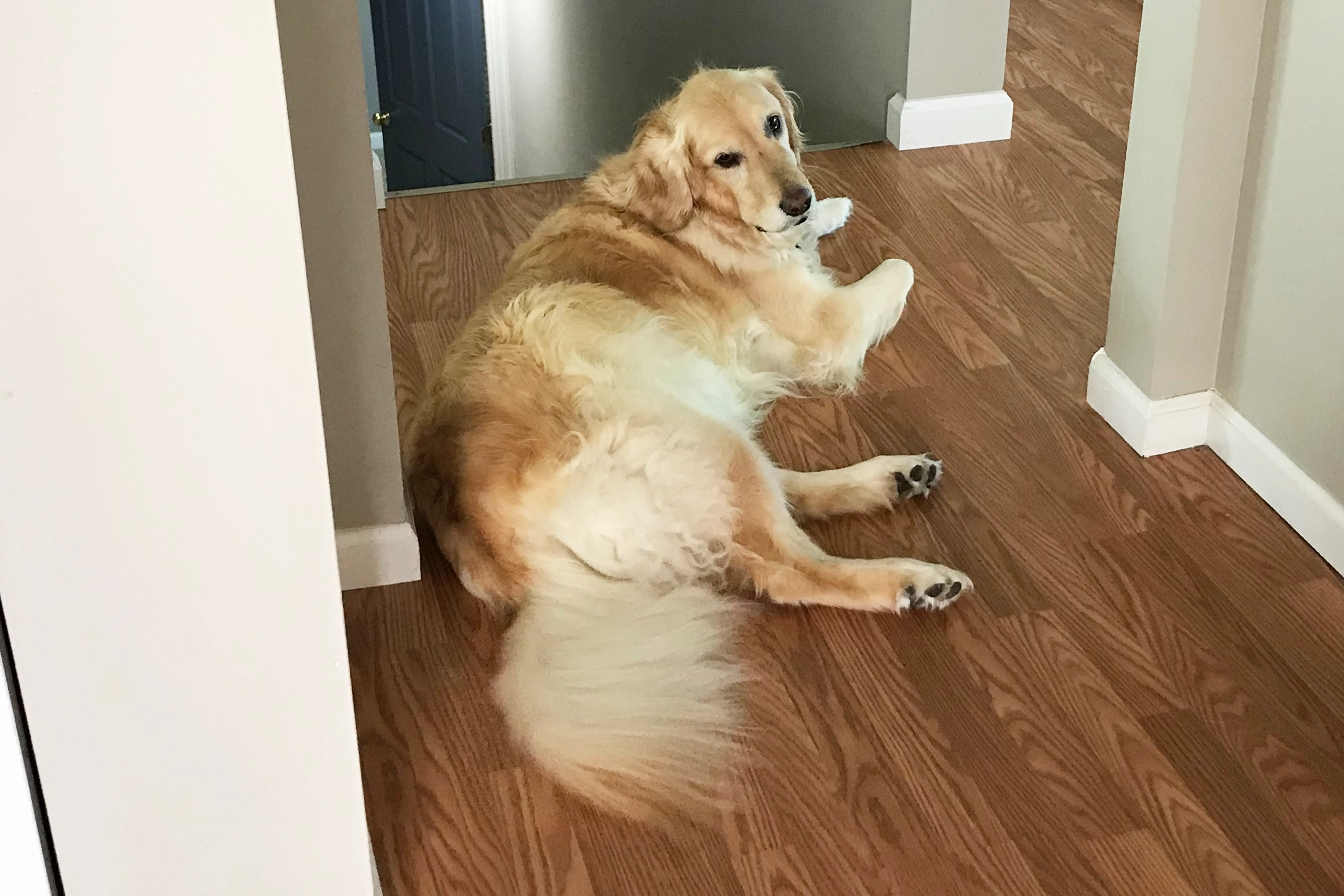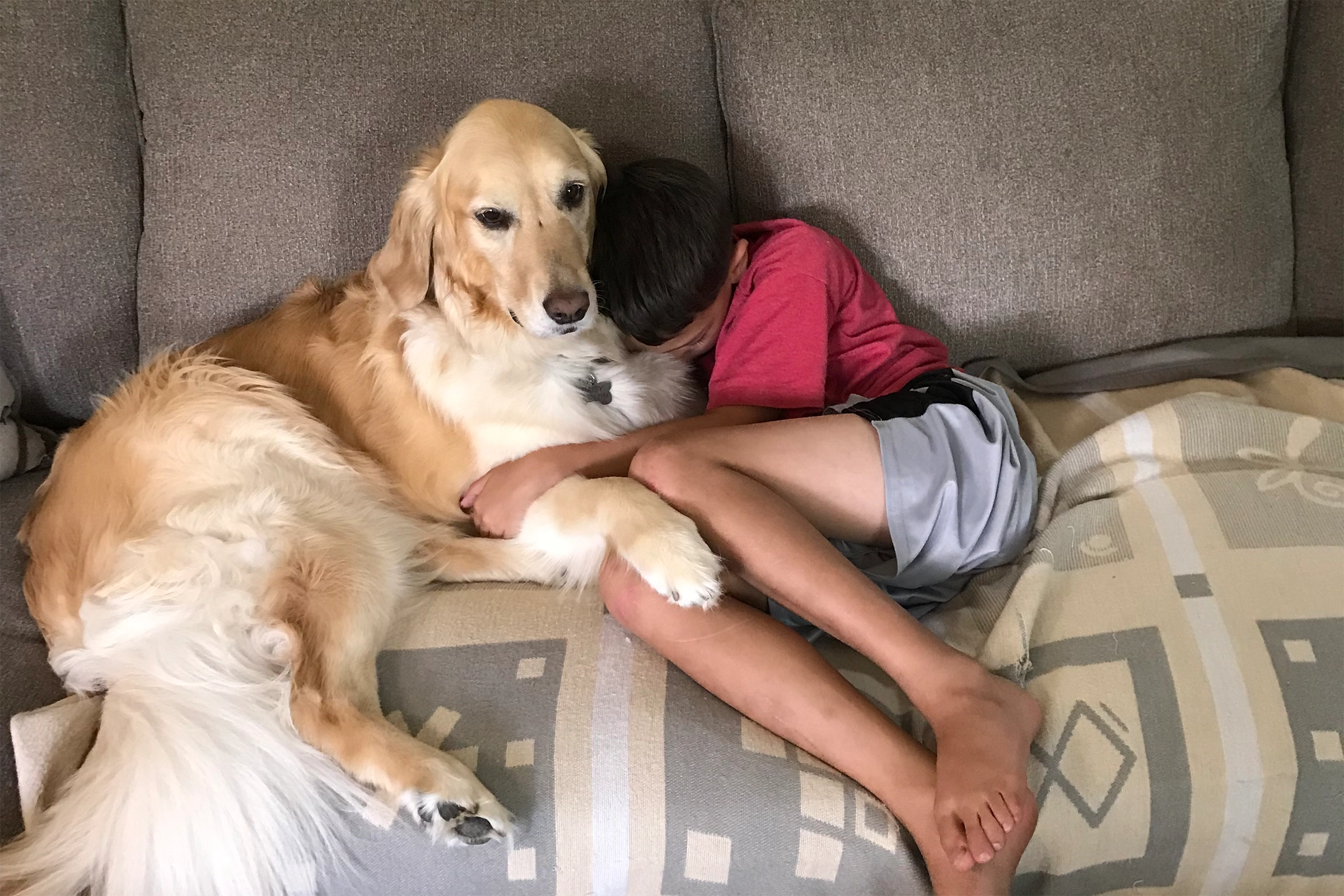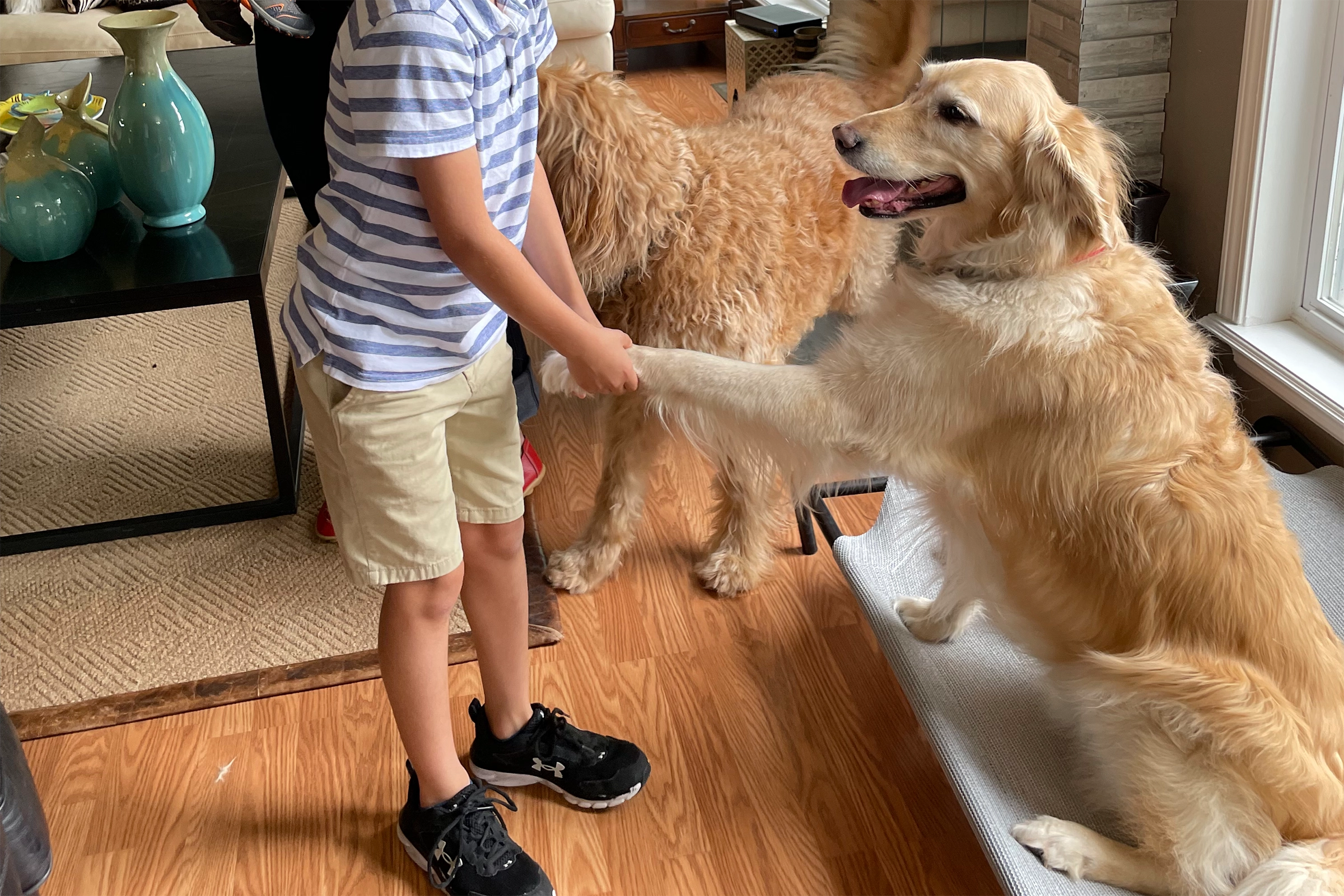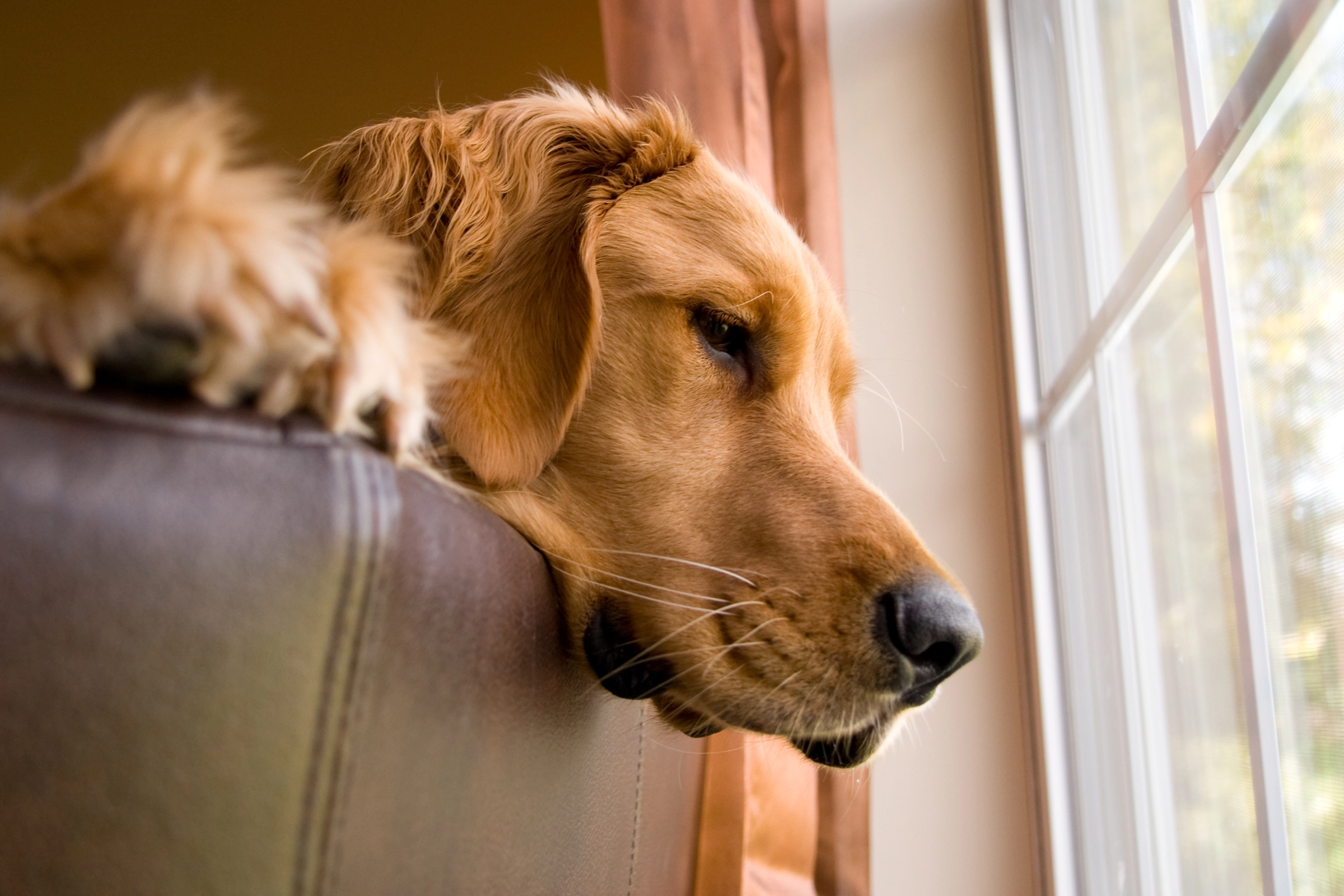This post may contain ads and affiliate links and we may earn a small commission when you click on the links at no additional cost to you. As an Amazon Affiliate, we earn from qualifying purchases. You can read our full disclaimer here.
Can Golden Retrievers Be Left Alone? Golden Rules of Alone Time

Can golden retrievers be left alone? This question lingered in my mind as I welcomed my first Golden Retriever into our family.
Over the years, I’ve been blessed to share my life with three remarkable Golden Retrievers, each bringing a unique blend of love, energy, and mischief.
The days were filled with joy as my first two canine pals accompanied me to our office, their tails wagging and eyes gleaming with anticipation.

When the third, a bundle of golden fur and boundless enthusiasm, came into our lives, I found myself working from home. This shift meant she was rarely alone, always surrounded by familiar voices and comforting presences.
Can Golden Retrievers be Left Alone — Even Though They are Wired for Love and Affection?
Understanding a Golden Retriever’s needs is crucial, especially when it concerns their time spent alone. They’re not just pets; they’re family, wired to be sociable and deeply connected to their human counterparts.

Leaving them on their own can pose challenges, but with knowledge and preparation, both the owner and the pet can navigate this aspect of their relationship with ease and confidence.
Understanding Golden Retrievers
To fully address the question, “Can Golden Retrievers be left alone?”, we must delve deep into the very core of the breed’s origin and behavioral tendencies.
Recognizing their history and social inclinations is essential in comprehending their suitability and needs in modern-day settings.
Breed Background and its Relevance to Can Golden Retrievers Be Left Alone
Golden Retrievers, with their radiant golden sheen and heartwarming demeanor, possess a rich and captivating lineage:
- Origins: Emerged in Scotland’s highlands during the mid-19th century.
- Purpose: Specially bred for retrieving game in challenging terrains, both water and land.
- Creator: Lord Dudley Marjoribanks, commonly known as Lord Tweedmouth.
- Evolution: Initial crossbreeding involved a Yellow Retriever and the now-extinct Tweed Water Spaniel, with subsequent introductions of Bloodhounds, Irish Setters, more Tweed Water Spaniels, and St. John’s Water Dogs.
- Diverse Roles: Beyond hunting, their temperament saw them excel in varied roles, such as search and rescue, and even therapeutic assistance.
The historical origins of the Golden Retriever are crucial to understand. These dogs were not merely bred for their physical prowess but also for their temperament, which needed to sync harmoniously with their human counterparts during hunts.
Their foundation as a breed was intertwined with human interaction, establishing a rapport that persists today.
Their Sociable Nature: Emphasizing Their Love for Human Company

The affection and loyalty exhibited by Golden Retrievers aren’t just individual quirks; they’re deep-seated characteristics that define the breed:
- Inherent Friendliness: Known for their boundless enthusiasm, they rarely discriminate between familiar faces and new acquaintances.
- Historical Bonding: Historically, they’ve been in tandem with humans, owing to their roles as hunting companions.
- A Genuine Need: Their desire for human connection isn’t just behavioral but a deeply embedded genetic trait.
It’s impossible to underline the essence of a Golden Retriever without emphasizing its sociable nature. Their innate affinity for human company makes them exceptional companions, but it also poses questions about their ability to tolerate extended periods of solitude.
Understanding this breed is the first step in ensuring their well-being and happiness and finding the answer to can Golden Retrievers be left alone.
Can Golden Retrievers Be Left Alone? Delving into Separation Anxiety
Golden Retrievers exude immense love and loyalty, two traits that make them exceptional companions. Yet, these very qualities can sometimes lead to a complex issue: separation anxiety.
For potential and current Golden Retriever owners, understanding this condition is vital. It ensures that the bond between dog and owner remains harmonious and strong.
Spotting the Signs of Separation Anxiety
Separation anxiety manifests in several unmistakable behaviors. When left alone, the depth of a Golden Retriever’s distress can be profound, sometimes more than other breeds.
Here are clear signs that your retriever may be grappling with this condition:
- Persistent Vocalization: They might bark or howl continuously, particularly soon after you’ve stepped out.
- Destructive Actions: Finding chewed up furniture or shoes? It’s a classic sign.
- Indoor Accidents: Regardless of their potty-training, they might urinate or defecate indoors.
- Restlessness: A noticeable pacing or moving in set patterns.
- Escape Efforts: They could attempt exits, sometimes even risking injury.
- Clinginess: When you are home, they might shadow you relentlessly, exhibiting distress if they sense you’re about to leave.
Root Causes Specific to Golden Retrievers

The next pertinent question is, why? Why do Golden Retrievers, in particular, experience such heightened separation anxiety? The reasons delve into their very nature and history:
- Inherent Companionship: Bred to be alongside humans, being alone feels unnatural.
- Routine Shifts: Any drastic change, like a house move or altered work hours, can unsettle them.
- Past Traumatic Experiences: A stay at a kennel or a terrifying thunderstorm could escalate anxiety.
- Ageing Factors: With age, some retrievers might face cognitive challenges, amplifying anxiety.
- Physical and Mental Stimulation: Golden Retrievers are active and intelligent. Deprived of exercise or engagement, their feelings of isolation intensify.
You’ll like this post too: Worst Age for Golden Retrievers!
The Domino Effect of Neglecting the Issue of Can Golden Retrievers Be Left Alone?
Dismissing or trivializing separation anxiety is a path fraught with repercussions. The impact on both the Golden Retriever’s well-being and the household’s harmony can be substantial. Here’s the potential fallout:
- Physical Injuries: Their actions, driven by anxiety, could lead to self-harm.
- Erosion of Training: Those hours spent on training? They could unravel, leading to behaviors like house soiling.
- Dipping Life Quality: Their zest for life can ebb, robbing them of joy.
- Relationship Strain: The human-dog bond might experience tension, leading to mutual frustration.
- Rehoming Considerations: In extreme cases, owners might feel the overwhelming urge to give up on their pets.
Golden Retrievers, with their amiable nature, bring immeasurable joy to homes. To return that joy, it’s crucial for owners to ask and address, “Can Golden Retrievers be left alone?”
By staying informed and proactive, we can ensure their happiness remains uncompromised.
The Golden Retriever’s Need for Company
When we think of Golden Retrievers, we often picture their bright eyes, wagging tails, and golden coats. But beneath that cheerful exterior lies a deep need for companionship. This isn’t a mere preference but a fundamental part of their nature.
If you’re thinking of welcoming a Golden into your life or petsitting one, here’s what you should know.
The Pack Mentality Runs Deep
Golden Retrievers carry a hint of their wolf ancestors in them. This history shapes many of their behaviors today:
- Living in Groups: Back in the day, packs meant survival. They offered protection, assistance in hunting, and warmth. Today, Golden Retrievers still crave this group dynamic. So, they’ll naturally gravitate towards family gatherings and activities.
- Understanding Their Role: Within every pack, there’s a structure. Even in a home setting, a Golden will try to find where they fit within the family, seeing them as their “pack.”
- Teamwork Matters: From wolves hunting together to Retrievers playing fetch, the essence remains the same. They love participating in group activities, be it a game or a family outing.
They Bond Like Super Glue
Golden Retrievers don’t just want company; they want your company. Their bond with their owners stands out:
- Loyalty Shines: Once a Golden Retriever bonds with you, they stick by your side. Always.
- Feeling Your Vibes: Happy or sad, your Golden will pick up on it. They’ll celebrate your joys and try to lift you up during your lows.
- Closeness is Key: If you’ve ever felt a nuzzle during a movie night or found a Golden resting by your feet, you know they cherish physical closeness.
What This Means for Owners and Sitters
With such a profound need for company, Golden Retrievers require certain considerations:
- Invest Your Time: A Golden isn’t a ‘leave-behind’ pet. They thrive on interaction and engagement. So, play, train, and spend quality time together.
- Give Them Space: They might not need a mansion, but a space to play and explore keeps them happy.
- Wear Your Heart on Your Sleeve: These dogs don’t just want your time; they want your heart. They thrive on affection and emotional bonding.
- A Note for Sitters: Caring for a Golden isn’t only about the basics. It’s about companionship. Play with them, engage them, and ensure they don’t feel alone.
To wrap it up, Golden Retrievers are more than just pets. They’re companions craving connection. By understanding their deep-seated needs and catering to them, you’re in for a rewarding journey of love and loyalty.
How Long is Too Long? Can Golden Retrievers Be Left Alone?
Golden Retrievers have a reputation for being super social. But let’s be real. Life gets busy, and sometimes we have to leave our four-legged buddies behind. So, how long is too long?
Let’s dive deep and unravel this canine conundrum.
Puppy vs. Adult Dog: Who Waits Better?
Ah, puppies. Those little bundles of energy, curiosity, and well… accidents. Then there are the mature Goldens: calmer, trained, but still craving your company.
- Puppy Time-Out:
- Short and Sweet: Puppies have tiny bladders. And short attention spans. Leaving them alone for more than 2 hours? Not a great idea.
- Training Time: They’re learning. Potty training, obedience – it’s all new. Consistent check-ins help.
- The Adult Perspective:
- Holding the Fort: An adult Golden can hang solo for 4-6 hours. But remember, longer isn’t always better.
- Routine Rhythms: They’re creatures of habit. Regular walk times and playdates? They love ’em.
Factors Playing the Waiting Game
Not all Goldens are made equal. Some lounge happily alone, while others clock-watch, waiting for you.
- Age Matters: Younger dogs brim with energy. Older ones? They might appreciate a bit more solitude and fewer disturbances.
- Health Checks: A dog with medical needs? Regular check-ins become crucial.
- Training Grounds: A well-trained dog copes better. Simple as that.
Cracking the Ideal Duration
So, what’s the magic number? How long is the Goldilocks zone before it’s too much?
- The Sweet Spot: Generally, 4-6 hours tops for adult dogs. For puppies? Cut that down to 2.
- Stretching Limits:
- The No-Go Zone: Beyond 8 hours? You’re pushing it. Boredom and anxiety might creep in.
- Breaks and Breathers: If you’ve got a long day, schedule a mid-day walk or play session. Maybe get a neighbor or pet sitter to pitch in.
In a nutshell, while Goldens might look like they’re just waiting around, they’re counting on us to get back home. Remembering their limits and planning around them? That’s the key.
It’s all about finding that balance, ensuring our Goldens remain happy even when we’re not around.
Training Golden Retrievers for Alone Time: Can Golden Retrievers Be Left Alone?
So, you’ve got this beautiful, bouncy, and super-affectionate buddy, but sometimes you’ve got places to be, right?
Let’s dive into how we can train our Goldens to be cool cucumbers when we’re not around.
Gradual Training: Baby Steps to Solo Time
Think of it as teaching a kid to swim. You don’t just chuck ’em in the deep end.
- Start Small: Leave for short durations. Maybe just step outside and come back in.
- Increase Intervals: Extend your time away bit by bit. Five minutes. Fifteen. An hour. You get the gist.
- Monitor Reactions: Got a doggy cam? Great. No? Maybe check in every once in a while, just to see how they’re holding up.
The Role of Exercise: A Tired Golden is a Chill Golden
You know the drill. A tired dog is a happy dog, especially when they’re home alone.
- Morning Ritual: A good run or brisk walk can work wonders. Gets them in that relaxed zone.
- Play Fetch: Classic, but gold. Gets out that extra bit of energy.
- Mental Games: Puzzle toys or treat games? Yes, please. It’s like Sudoku for dogs.
Safe Spaces: Their Own Little Zen Den
Everyone needs their comfy corner, even our furry pals.
- Choose the Spot: Whether it’s a cozy corner or their bed, make sure it’s quiet and peaceful.
- Comfort Items: Toys, blankets, maybe an old t-shirt that smells like you? All great options.
- Avoid Confinement: Unless they’re crate trained and love it, avoid locking them in. It’s about a safe space, not a prison.
Positive Reinforcement: All About the Good Vibes
Dogs dig rewards. Especially Goldens. They live for that “good boy” or “good girl” affirmation.
- Coming Home Treats: When you get back, maybe give them a treat. It links your return to something yum.
- Praise Galore: A big fuss and lots of petting work wonders. Let them know they did great.
- Consistency: Make this a habit. Dogs love routines.
Addressing and Overcoming Separation Anxiety
Let’s get real. Sometimes, even with all the training, Goldens can get a bit anxious. Let’s tackle that head-on.
- Identify the Signs: Pacing, whining, excessive barking? Could be anxiety.
- Distraction Techniques: Leave on a calming doggy playlist or maybe some soothing sounds. Nature sounds, perhaps?
- Reassurance: Sometimes, they just need to know you’re coming back. A quick pat or soothing word before you leave can help.
- Professional Help: If things seem severe, maybe consider doggy therapy or professional training.
Prepping our Golden Retrievers for some solo time doesn’t need to feel like rocket science. With patience, consistency, and lots of love, you can ensure your furball feels safe and secure, even when you’re away.
Engaging Activities and Toys for Golden Retrievers: Can Golden Retrievers Be Left Alone and Still Have Fun?

Golden Retrievers, with their boundless energy and love for play, can sometimes feel like having a toddler around. And like toddlers, they crave stimulation, especially when home alone.
But fret not! We’ve rounded up some of the best toys and activities that’ll keep your Golden entertained and happy.
Toys to Keep That Wagging Tail Busy
Ah, toys! They’re not just bits of rubber or fabric; they’re a Golden’s passport to a world of fun.
- Chew Toys:
- Why They’re Great: They’re perfect for teething puppies and adults who love a good gnaw.
- Bonus Point: They give your shoes and furniture a break.
- Hot Picks: Look for durable options, like Kong toys or nylon bones.
- Puzzle Toys:
- Brain Teasers: Think of these as the dog version of escape rooms. They challenge your pet’s mind!
- Treats Inside: Most have compartments for treats. As your dog solves the puzzle, they get rewarded.
- Top Choices: Brands like Outward Hound or Nina Ottosson offer some cool varieties.
- Interactive Toys:
- Engagement Level 100: These toys react to your dog, be it with movement, noise, or both.
- Tech Meets Play: Some even come with apps so you can control or monitor the play while away.
- Fan Favorites: Toys like the iFetch (for those fetch-loving Goldens) or dancing robot toys that move unpredictably.
Activities: More Than Just Fetch
Sure, toys are fun. But activities? They engage your Golden’s mind and senses in a whole new way.
- Treasure Hunts: All About the Sniff and Search:
- Setting It Up: Hide treats in different parts of the house. Make some easy to find and others a bit tricky.
- Sniffing Around: Watch (or later check via cam) your Golden use their super sniffing powers to hunt down these treats.
- Benefits: It’s not just fun; it’s mentally stimulating. Plus, it’s super cute to watch!
- Setting up Playdates: Social Butterflies Unite:
- Why It’s Cool: Goldens are sociable. Interacting with other dogs? It’s like a kiddo’s playdate, but furrier.
- How to Go About It: Connect with fellow dog owners in your area or consider a local doggy daycare for occasional visits.
- Safe Play: Ensure both dogs are well-socialized and the area is secure. Start with short playtimes and increase gradually.
- Music and Sounds: Zen Mode On:
- The Science: Some studies suggest dogs can feel relaxed with certain types of music. Think spa day, but for dogs.
- Setting the Mood: Classical, soft rock, or even reggae can do the trick. Avoid heavy metal, though. We’re aiming for chill, not a mosh pit.
- Soundscapes: If music isn’t their jam, try nature sounds. Rain, birds, or gentle streams can work wonders.
Whether it’s the joy of a new toy or the thrill of a treat hunt, keeping your Golden Retriever engaged when home alone is totally doable.
So next time you head out, you can do so with the peace of mind that your pup is not just waiting, but having a blast!
Wrap Up to Can Golden Retrievers Be Left Alone
Golden Retrievers, with their playful spirit and loving nature, thrive on engagement and companionship. With the right toys, activities, and training, ensuring they’re content even when left alone becomes a breeze.
As you venture out, take comfort in knowing that your furry friend is safe, entertained, and eagerly awaiting your return.
-

Coffee Mug – In Dog Coffees I’ve Only Had One
$11.95 – $14.95 Select options This product has multiple variants. The options may be chosen on the product page



